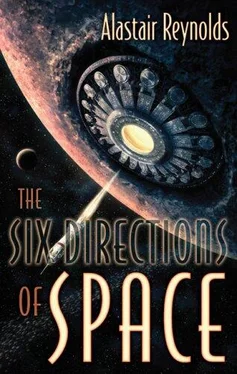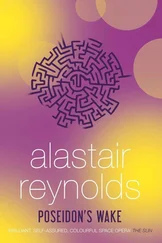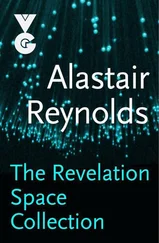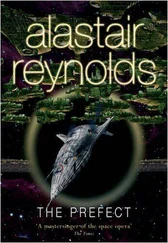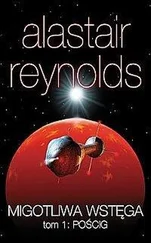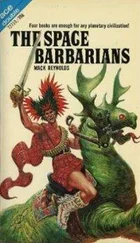“Why?”
He spoke as if the answer should have been obvious. “Because unless they are pilots like me, on specific intelligence-gathering missions, they would rather keep transitioning between versions of the Infrastructure, than emerge into what is likely to be a densely populated interchange. Eventually, they hope to detect the microsignatures in the tunnel physics that indicate that they have returned home.”
“Signatures that we can’t read,” I said.
“I will attempt to refine my interpretation of the sensor data. Given time, I may be able to improve matters. But that is some way off.”
“We’ll take our chances with Gansu,” Qilian said.
There was, as I understood it, a small but nonnegligible possibility that the weakening had shunted us back into our own version of the Tract—we would know if we emerged into the nexus and I saw advertisements for Sorkan-Shira rental ponies. Muhunnad assured us, however, that such an outcome was very unlikely. Once we were elsewhere, we would only get home again by throwing the dice repeatedly, until our own special number came up.
For all that, when we did emerge into the Gansu nexus, my first thought was that Muhunnad had been wrong about those odds. Somehow or other, we had beaten them and dropped back into our own space. As the door opened to admit us back into the spherical volume of the hollowed-out moon, I had the same impression of teeming wealth; of a city packed tight around the central core, of luminous messages rising up the ninety-nine golden spokes, of the airspace thick with jewel-bright ships and gaudily patterned, mothlike shuttles, the glittering commerce of ten thousand worlds.
And yet, it only took a second glimpse to see that I was wrong.
This was no part of the Mongol Expansion. The ships were wrong; the shuttles were wrong: cruder and clumsier even than our most antiquated ships. The city down below had a haphazard, ramshackle look to it, its structures ugly and square-faced. The message on the spokes were spelled out in the angular letters of that pre-Mongol language, Latin. I could not tell if they were advertisements, news reports, or political slogans.
We slowed down, coming to a hovering standstill relative to the golden spokes and the building-choked core. The Mandate of Heaven had only just cleared the portal entrance, with the door still open behind it. I presumed that some automatic system would not permit it to close with a ship still so close.
Qilian was a model of patience, by his standards. He gave Muhunnad several minutes to digest the information arriving from the River Volga’s many sensors.
“Well, pilot?” he asked, when that interval had elapsed. “Do you recognize this place?”
“Yes,” Muhunnad said. “I do. And we must leave, now.”
“Why so nervous? I’ve seen those ships. They look even more pathetic and fragile than ours must have seemed to you.”
“They are. But there is no such thing as a harmless interstellar culture. These people have only been in space for a couple of hundred years, barely a hundred and fifty since they stumbled on the Infrastructure, but they still have weapons that could hurt us. Worse, they are aggressors.”
“Who are they?” I whispered.
“The culture I mentioned to you back on the Qing Shui moon: the ones who are now in their twenty-third century. You would call them Christians, I suppose.”
“Nestorians?” Qilian asked, narrowing his eyes.
“Another offshoot of the same cult, if one wishes to split hairs. Not that many of them are believers now.
There are even some Islamists among them, although there is little about the Shining Caliphate that they would find familiar.”
“Perhaps we can do business with them,” Qilian mused.
“I doubt it. They would find you repulsive, and they would loathe you for what you did to them in your history.”
It was as if Muhunnad had not spoken at all. When he alluded to such matters, Qilian paid no heed to his words. “Take us closer to the core,” he said. “We didn’t weld all this armor onto the Volga for nothing.”
When Muhunnad did not show readiness to comply with Qilian’s order, a disciplinary measure was administered through the input sockets of the harness. Muhunnad stiffened against his restraints, then—evidently deciding that death at the hands of the Christians was no worse than torture by Mongols—he began to move us away from the portal.
“I am sorry,” I whispered. “I know you only want to do what’s best for us.”
“I am sorry as well,” he said, when Qilian was out of earshot. “Sorry for being so weak, that I do what he asks of me, even when I know it is wrong.”
“No one blames you,” I replied.
We had crossed five hundred li without drawing any visible attention from the other vessels, which continued to move through the sphere as if going about their normal business. We even observed several ships emerge and depart through portals. But then, quite suddenly, it was as if a great shoal of fish had become aware of the presence of two sleek, hungry predators nosing through their midst. All around us, from one minute to the next, the various craft began to dart away, abandoning whatever course or errand they had been on before. Some of them ducked into portals or lost themselves in the thicket of spokes, while others fled for the cover of the core.
I tensed. Whatever response we were due was surely on its way by now.
As it happened, we did not have long to wait. In contrast to the civilian vessels attempting to get as far away from us as possible, three ships were converging on us. We studied them on high magnification, on one of the display screens in the River Volga’s bridge. They were shaped like arrowheads, painted with black and white stripes and the odd markings of the Christians. Their blade-sharp leading edges bristled with what could have been sensors, refueling probes, or weapons.
From his couch, Muhunnad said: “We are being signaled. I believe I can interpret the transmission.
Would you like to see it?”
“Put it on,” Qilian said.
We were looking at a woman who was wearing a heavy black uniform, shiny like waxed leather. She was pinned back into a heavily padded seat: I did not doubt that I was looking at the pilot of one of the ships racing to intercept us. Much of her face was hidden under a globular black helmet, with a red-tinted visor lowered down over her eyes. On the crown of the helmet was a curious symbol: a little drawing of Earth, overlaid with lines of latitude and longitude, and flanked by what I took to be a pair of laurel leaves. She was speaking into a microphone, her words coming over the bridge speaker. I wished I had studied more dead languages at the academy. Then again, given my lack of success with Arabic, perhaps I would still not have understood her Latin either.
What was clear was that the woman was not happy; that her tone was becoming ever more strident. At last, she muttered something that, had she been speaking Mongol, might have been some dismissive invitation to go to hell.
“Perhaps we should turn after all,” Qilian said, or started to say. But by then, the three ships had loosed their missiles: four apiece, grouping into two packs of six, one for the Mandate of Heaven and one for us.
Muhunnad needed no further encouragement. He whipped us around with all haste, pushing the River Volga’s thrust to its maximum. Again, the stress of it was enough to set the ship protesting. At the same time, Muhunnad brought our own weapons into use, running those guns out on their magnetic cradles and firing at the missiles as they closed distance between us and the Christians. Given the range and efficacy of our beam weapons, it would not have troubled him to eliminate the three ships. In concentrating on the missiles, not the pursuers, he was doing all that he could not to inflame matters further. As an envoy of Greater Mongolia, I suppose I should have been grateful. But I was already beginning to doubt that the fate of my empire was going to be of much concern for me.
Читать дальше
